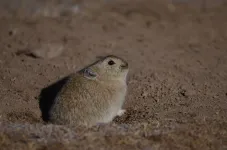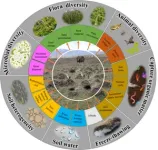(Press-News.org) A new article published in the Journal of Animal Ecology suggests that current measures to protect grasslands in the Qinghai-Tibetan Plateau are damaging the ecosystem and should be stopped.
The existing policy, introduced in 2000, calls for the eradication of small burrowing mammals. These include the mountain-dwelling herbivores, the plateau pika, and another small rodent, the zokor. Both are keystone species and are known as ecosystem engineers due to their modification of and impact on the environment.
The report's authors say that the current extermination programmes are not based on studies that considered the full effects of culling these rodents.
"The government agency's policy of conducting large-scale animal culling campaigns each year is not a good approach," says Professor Johannes Knops from the Health and Environmental Sciences department at Xi'an Jiaotong-Liverpool University (XJTLU) and corresponding author.
Professor Knops and the first author, Dr Wenjin Li from the College of Ecology at Lanzhou University, propose replacing the eradication policy with a nature-based control strategy.
"Our research shows that using natural predators and other ecological factors to regulate burrowing mammal populations can be a more sustainable and effective approach to grassland management."
The study has important implications for grassland management practices worldwide.
Small burrowing mammals are common in grasslands, and their eradication can negatively impact ecosystem health and productivity.
A balancing act
The Qinghai-Tibetan Plateau grasslands play a crucial role in the quality of water flowing into major Asian rivers, including the Yangtze, Yellow, Lancang-Mekong, Indus and Ganges. Grassland degradation can also increase the chance of flooding events.
The campaign to permanently eradicate plateau pikas and zokors is part of Chinese government agencies' efforts to protect the grasslands.
The policy is part of a nationwide initiative, the Returning Grazing Land to Grassland project, and is based on the assumption that the rodents cause damage to grasslands by consuming foliage and therefore compete with grazing livestock for food, and cause soil erosion.
However, the new study discusses the irrationality and consequences of this policy and reports that small burrowing mammals can actually help to prevent grassland degradation.
Professor Knops says: "If we look at the grasslands, we will find numerous plant species, and not all animals eat the same plants, so it is crucial to consider the entire food chain rather than killing all the small mammals."
The authors also say that burrowing animals can increase plant diversity as they increase seed dispersion and light availability by consuming taller grasses. Their burrows provide refuges and habitats for other species and can help to decrease surface water runoff and soil erosion.
The researchers advise that the eradication policy needs to be reconsidered and revoked, as small burrowing mammals play crucial ecological roles in grassland management. They say that diminishing the rodent population disrupts ecosystem processes and reduces biodiversity.
The research also suggests that the current poisoning method used to eradicate small burrowing mammals has several overlooked adverse effects.
Collateral damage
In the paper, the authors discuss the potential unintended consequences of using the high-cost and labour-intensive poisoning method to kill small mammals in grasslands. These include the development of resistance to poisons by target species and potential harm to non-target species.
Additionally, this policy can increase human-wildlife conflict by reducing natural predator populations and creating imbalances in the ecosystem.
Professor Knops explains: "It's important to consider the knock-on effects of reducing the small burrowing mammal population. If there are fewer small mammals, there is less food for their natural predators, such as red foxes, steppe polecats, upland buzzards, brown bears and mountain weasels.
"Not only will these larger mammals start to look for alternative food sources and increasingly prey on livestock, causing more human-wildlife conflict, but their populations will also decrease.
"The eradication policy, therefore, causes the opposite effect to the one intended, as when the number of the pika and zokor's natural predators is reduced, burrowing mammal populations can increase rapidly.
"This then requires more human control, which is costly and negatively impacts non-target species and the environment."
Rethinking control
The researchers suggest the goal to control burrowing mammal populations should not be totally eradicated but can be regulated with a nature-based control strategy that uses natural predators and other environmental factors such as their preferred plant species and the height of vegetation.
The report proposes measures such as providing nesting spaces for raptors and reducing the over-grazing of livestock on the grasslands. This allows the grass to grow and keeps the small mammal population at a manageable level, as they prefer shorter vegetation.
The authors argue that this approach is more effective and sustainable for long-term grassland management than traditional methods that rely heavily on human intervention and poisoning.
Professor Knops says: "By maintaining a stable, low density of burrowing mammals using natural predators and ecological factors, we can promote sustainable livestock grazing practices while also preserving biodiversity and reducing human-wildlife conflicts."
Further research is needed to refine this approach and test its effectiveness in various grassland ecosystems. Still, the study's findings offer important insights into the ecological roles of small burrowing mammals in grasslands and how their presence can benefit ecosystem health and productivity.
END
Stop eradication of small mammals to protect vital ecosystems, say scientists
A new report suggests that policymakers should rethink the current measures to protect grasslands. The researchers propose a nature-based control strategy for more sustainable management of essential ecosystems.
2023-05-22
ELSE PRESS RELEASES FROM THIS DATE:
Study linking mucus plugs and COPD mortality could help save lives
2023-05-21
A retrospective analysis of patient data from the COPDGene study suggests that targeting mucus plugs could help prevent deaths from chronic obstructive pulmonary disease—the fourth leading cause of death in the United States
Many patients with chronic obstructive pulmonary disease (COPD) experience airway-clogging mucus plugs, an accumulation of mucus in the lungs that can affect quality of life and lung functioning. A new study led by researchers from Brigham and Women’s Hospital, a founding ...
Sacubitril/valsartan shows benefit in heart failure with ejection fraction above 40%
2023-05-21
Prague, Czechia – 21 May 2023: Sacubitril/valsartan leads to greater reduction in plasma NT-proBNP levels compared to valsartan alone after stabilisation for worsening heart failure in patients with an ejection fraction (EF) above 40%, according to late breaking science presented today at Heart Failure 2023, a scientific congress of the European Society of Cardiology (ESC),1 and published in the Journal of the American College of Cardiology.
Principal investigator Dr. Robert Mentz of Duke University Medical Center, Durham, US said: “These data add to the evidence supporting a potential treatment benefit of sacubitril/valsartan ...
New device gently moves esophagus, making heart ablations safer, study found
2023-05-21
A new device invented with the help of an electrophysiologist at The Ohio State University Wexner Medical Center makes a heart procedure safer for patients suffering from atrial fibrillation (AFib), a common irregular heart rhythm.
AFib affects millions of people worldwide and greatly increases their risk of stroke and heart failure. To treat AFib, doctors use cardiac ablation to help restore the heart’s rhythm. Heat or cold energy delivered through a catheter destroys the heart tissue causing rapid and irregular heartbeats. ...
Society for Cardiovascular Angiography & Interventions names George D. Dangas, MD, MSCAI, President for 2023-24
2023-05-21
PHOENIX (May 20, 2023) – George D. Dangas, MD, PhD, MSCAI, Professor of Medicine (Cardiology and Surgery), and Director of Cardiovascular Innovation at the Zena and Michael A. Weiner Cardiovascular Institute at the Icahn School of Medicine of Mount Sinai in New York City, and Chief of Cardiology at Mount Sinai Queens assumed the office of president of the Society for Cardiovascular Angiography & Interventions (SCAI) today during the closing ceremonies at the SCAI 2023 Scientific Sessions in Phoenix, AZ.
Dr. Dangas is an authoritative voice in the performance of nonsurgical cardiovascular and valve interventions using both established ...
SCAI announces 2023-24 SCAI-WIN CHIP Fellowship Recipient
2023-05-21
PHOENIX (May 20, 2023) – Njambi Mathenge, MD, MPH, an interventional cardiology fellow at the Massachusetts General Hospital has been selected as the recipient of the SCAI-Women in Innovations (SCAI-WIN) CHIP Fellowship, the Society for Cardiovascular Angiography and Interventions announced today.
The $115,000 fellowship opportunity was made possible by support from Abiomed (founding supporter), Boston Scientific, Medtronic, and Shockwave Medical, Inc., and is offered to interventional cardiology (IC) fellows or practicing interventional cardiologists interested in ...
SCAI announces new award recognizing the contributions of early career interventional cardiologists
2023-05-21
PHOENIX (May 20, 2023) – Today during the SCAI 2023 Scientific Sessions, thirty early-career interventional cardiologists were the inaugural recipients of a newly created award highlighting excellence in interventional cardiology. 30 in Their 30’s is a new recognition program created by the Society for
Cardiovascular Angiography & Interventions (SCAI) for early-career members for their proven leadership and demonstration of SCAI’s core values.
30 in Their 30’s recognizes the best and brightest young professionals in interventional cardiology. This award ...
Society for Cardiovascular Angiography and Interventions bestows highest designation ranking to leading interventional cardiologists
2023-05-21
PHOENIX (May 20, 2023) – Today, the Society for Cardiovascular Angiography & Interventions (SCAI) announced its 2023 Master Interventionalists of SCAI (MSCAI) designation recipients during the SCAI 2023 Scientific Sessions in Phoenix.
The MSCAI designation is awarded to individuals who have demonstrated excellence in invasive/interventional cardiology over the course of their career and for their commitment to the highest levels of clinical care, innovation, publication, and teaching.
This year’s MSCAI designations were awarded to the following group of outstanding interventionalists:
David ...
HRS, APHRS, and LAHRS release cardiac physiological pacing guideline
2023-05-20
New Orleans, May 20, 2023 – Today, the Heart Rhythm Society (HRS), Asia Pacific Heart Rhythm Society (APHRS), and Latin American Heart Rhythm Society (LAHRS) released a new clinical practice guideline on cardiac physiologic pacing (CPP) strategies to restore ventricular synchrony and improve cardiac performance. The 2023 HRS/APHRS/LAHRS Guideline on Cardiac Physiologic Pacing for the Avoidance and Mitigation of Heart Failure is intended to provide guidance to clinical cardiac electrophysiologists, cardiologists, and other clinicians on the use of CPP, which includes cardiac resynchronization therapy and conduction system pacing, in patients ...
Tokyo Tech and HPE collaborate to build the next generation TSUBAME4.0 supercomputer for artificial intelligence, scientific research, and innovation
2023-05-20
Tokyo Institute of Technology (Tokyo Tech) Global Scientific Information and Computing Center (GSIC) and Hewlett Packard Enterprise (NYSE: HPE) announced to build its next-generation supercomputer, TSUBAME4.0, to accelerate AI-driven scientific discovery in medicine, materials science, climate research, and turbulence in urban environments.
Tokyo Tech is one of the world's leading universities in science and technology. With the TSUBAME4.0 supercomputer, users will have the ability to train ...
Heart attack patients with strong legs have better prognosis
2023-05-20
Prague, Czechia – 20 May 2023: People with strong legs are less likely to develop heart failure after a heart attack, according to research presented today at Heart Failure 2023, a scientific congress of the European Society of Cardiology (ESC).1
Myocardial infarction is the most common cause of heart failure,2 with around 6–9% of heart attack patients going on to develop the condition.3,4 Previous research has shown that having strong quadriceps is associated with a lower risk of death in patients with coronary artery disease.5
This study tested ...
LAST 30 PRESS RELEASES:
Genetic risk for mental illness is far less disorder-specific than clinicians have assumed, massive Swedish study reveals
A therapeutic target that would curb the spread of coronaviruses has been identified
Modern twist on wildfire management methods found also to have a bonus feature that protects water supplies
AI enables defect-aware prediction of metal 3D-printed part quality
Miniscule fossil discovery reveals fresh clues into the evolution of the earliest-known relative of all primates
World Water Day 2026: Applied Microbiology International to hold Gender Equality and Water webinar
The unprecedented transformation in energy: The Third Energy Revolution toward carbon neutrality
Building on the far side: AI analysis suggests sturdier foundation for future lunar bases
Far-field superresolution imaging via k-space superoscillation
10 Years, 70% shift: Wastewater upgrades quietly transform river microbiomes
Why does chronic back pain make everyday sounds feel harsher? Brain imaging study points to a treatable cause
Video messaging effectiveness depends on quality of streaming experience, research shows
Introducing the “bloom” cycle, or why plants are not stupid
The Lancet Oncology: Breast cancer remains the most common cancer among women worldwide, with annual cases expected to reach over 3.5 million by 2050
Improve education and transitional support for autistic people to prevent death by suicide, say experts
GLP-1 drugs like Ozempic could cut risk of major heart complications after heart attack, study finds
Study finds Earth may have twice as many vertebrate species as previously thought
NYU Langone orthopedic surgeons present latest clinical findings and research at AAOS 2026
New journal highlights how artificial intelligence can help solve global environmental crises
Study identifies three diverging global AI pathways shaping the future of technology and governance
Machine learning advances non targeted detection of environmental pollutants
ACP advises all adults 75 or older get a protein subunit RSV vaccine
New study finds earliest evidence of big land predators hunting plant-eaters
Newer groundwater associated with higher risk of Parkinson’s disease
New study identifies growth hormone receptor as possible target to improve lung cancer treatment
Routine helps children adjust to school, but harsh parenting may undo benefits
IEEE honors Pitt’s Fang Peng with medal in power engineering
SwRI and the NPSS Consortium release new version of NPSS® software with improved functionality
Study identifies molecular cause of taste loss after COVID
Accounting for soil saturation enhances atmospheric river flood warnings
[Press-News.org] Stop eradication of small mammals to protect vital ecosystems, say scientistsA new report suggests that policymakers should rethink the current measures to protect grasslands. The researchers propose a nature-based control strategy for more sustainable management of essential ecosystems.




